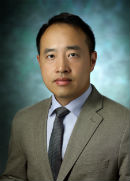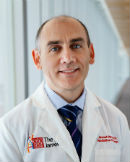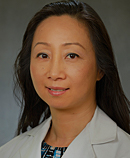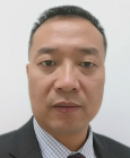Alumni Stories
Penn's Medical Physics Residency Program is one of the most sought after in the nations, a fact that can be largely attributed to its outcomes.
Since the program received its initial CAMPEP accreditation in 2009, its residents have achieved a 100 percent pass rate on the American Board of Radiology certification exam. Program alumni have successfully acquired position in academic medicine and private practice. Current placements include:
- Einstein Medical Center (Philadelphia area)
- Georgetown University Hospital
- Johns Hopkins University
- ProCure Proton Therapy Center (New Jersey)
- The Ohio State University
- University of California, San Francisco
- University of Pennsylvania
- Washington University School of Medicine

A medical physics residency is very critical because from there you can become an independent clinician and I feel fully capable as one thanks to my experience at Penn.
Ken Wang's introduction to Penn came when professor Timothy C. Zhu encouraged him to apply to a two-year post-doctoral fellowship. At the conclusion of those two years, the medical physics residency became a natural fit. Today, Dr. Wang is an assistant professor at Johns Hopkins University, a position for which he was recommended by another Penn faculty member.
Dr. Wang says the residency enabled him to move forward with his career with absolute confidence. "A medical physics residency is very critical because from there you can become an independent clinician and I feel fully capable as one thanks to my experience at Penn."

There's a reason for Penn's reputation: All of the latest instruments and technology are available. But Penn's knowledgeable, experienced faculty is really what makes the difference. Everywhere I turned, there was someone there to answer my question.
Ahmet Ayan was a post-doctoral fellow at Penn for three-and-a-half years before he started his residency. "So I knew what I was getting into," he says. Now, as an assistant professor at The Ohio State University, he finds himself sharing many of the lessons he learned at Penn with his own residents. In particular, never assume anything.
"There's a reason for Penn's reputation: All of the latest instruments and technology are available," Dr. Ayan says. "But Penn's knowledgeable, experienced faculty is really what makes the difference. Everywhere I turned, there was someone there to answer my question."

Penn's medical physics residency is the most comprehensive in the country. The intensive treatment planning training alone will benefit medical physicists through their careers.
Even as an engineer, Jennifer Zou was fascinated by medicine. In 2008, lured by Penn's new proton therapy program, Dr. Zou accepted a post-doctoral fellowship. She started her medical physics residency two years later.
Taking full advantage of both the clinical training and the research opportunities, Dr. Zou published one paper as a resident and three more within a year of her graduation, which she credits with helping her to secure a faculty appointment at Rutgers University, where she established the proton therapy program.
"Penn's medical physics residency is the most comprehensive in the country," says Dr. Zou, an assistant professor of radiation oncology at Penn today. "The intensive treatment planning training alone will benefit medical physicists through their careers."
.jpg)
I had the opportunity to see special treatments multiple times during the residency. Almost anywhere else, that level of exposure may have only come through seminars and textbooks.
There was a lot that drew Eric Diffenderfer to the medical physics residency-the state-of-the-art technology, the vast network and the constant research opportunities, for starters-but it was the clinical training that clinched his decision. Transitioning from a purely physics background, Dr. Diffenderfer, an associate professor of radiation oncology at Penn today, saw a high volume of patients and, with that, a wide variety of cases.
"I had the opportunity to see special treatments multiple times during the residency," he says. "Almost anywhere else, that level of exposure may have only come through seminars and textbooks."

General practice opens the door to pursue you own interests.
Haibo Lin's clinical experience was limited when he arrived at Penn, which concerned him. "I had a physics background, so human anatomy wasn't my strength," he says.
But he was immediately encouraged by the range of clinical opportunities and the logical progression of the residency. "It doesn't matter how much experience you have," says Dr. Lin. "Everyone starts with the core of the program."
Come the second year, he was able to appreciate the residency's flexibility. "General practice opens the door to pursue you own interests." Dr. Lin's pursuit has led him to the New York Proton Center, where he serves as the director of medical physics.

